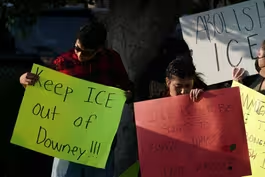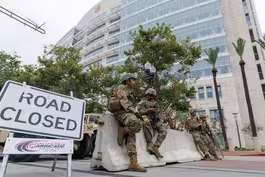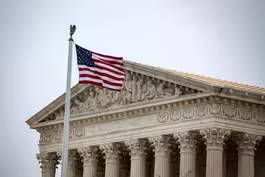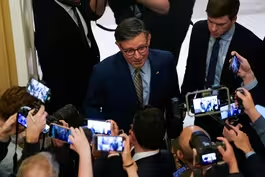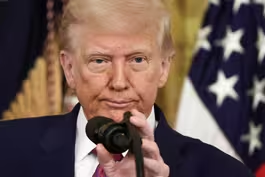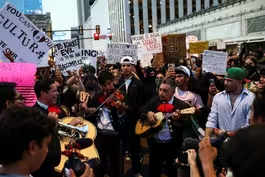
How USAID cuts are impacting the fight against HIV in Kenya
Clip: 6/12/2025 | 11m 12sVideo has Closed Captions
How USAID cuts are impacting the fight against HIV in Kenya
The Trump administration's cuts to the U.S. Agency for International Development have had reverberations around the world. The agency, which operated in over 100 nations and employed thousands of people, has been virtually eliminated. In partnership with the Pulitzer Center, William Brangham reports on the impact USAID cuts are having on HIV testing and treatment in Kenya.
Problems playing video? | Closed Captioning Feedback
Problems playing video? | Closed Captioning Feedback
Major corporate funding for the PBS News Hour is provided by BDO, BNSF, Consumer Cellular, American Cruise Lines, and Raymond James. Funding for the PBS NewsHour Weekend is provided by...

How USAID cuts are impacting the fight against HIV in Kenya
Clip: 6/12/2025 | 11m 12sVideo has Closed Captions
The Trump administration's cuts to the U.S. Agency for International Development have had reverberations around the world. The agency, which operated in over 100 nations and employed thousands of people, has been virtually eliminated. In partnership with the Pulitzer Center, William Brangham reports on the impact USAID cuts are having on HIV testing and treatment in Kenya.
Problems playing video? | Closed Captioning Feedback
How to Watch PBS News Hour
PBS News Hour is available to stream on pbs.org and the free PBS App, available on iPhone, Apple TV, Android TV, Android smartphones, Amazon Fire TV, Amazon Fire Tablet, Roku, Samsung Smart TV, and Vizio.
Providing Support for PBS.org
Learn Moreabout PBS online sponsorshipAMNA NAWAZ: The Trump administration's cuts to the U.S. Agency for International Development, or USAID, have reverberated around the world.
The agency, which operated in over 100 nations and employed thousands of people, has been virtually eliminated.
In partnership with the Pulitzer Center, William Brangham has been working on a series about USAID, and he joins us now.
William, good to see you.
AMNA NAWAZ: So this is a huge agency we're talking about, spent roughly $40 billion in taxpayer funds every year.
It's a big arm of American foreign policy.
Tell us about what you have been reporting on.
WILLIAM BRANGHAM: The big picture here is that USAID's goal, and this has been the bipartisan goal since its inception, is that this is in some ways an expression of America's moral obligation.
We're a superpower.
We are on the global stage, and we ought to help people in need.
But it's also served the secondary national security role, a very specific one, that this is soft power at its best.
It's burnished America's image with people all over the world.
It has helped keep an eye on infectious diseases and deal with climate crises.
It has, supporters say, tamped down drug trafficking and violent extremism, basically stopping threats before they come to America.
That's the big picture, but producer Molly Knight Raskin and I wanted to look very specifically at what USAID's work means for some very specific and vulnerable communities.
AMNA NAWAZ: So, tonight's report is from Kenya.
Tell us more about that, what the focus is.
WILLIAM BRANGHAM: Tonight's focus is on HIV and AIDS.
And Kenya has been doing a pretty good job thus far tamping down that virus.
And USAID has played a very big part in that.
When that support goes away -- I mean, there have been a lot of projections, we have reported on them, about the number of deaths that might occur.
And, frankly, it's still too early to really know.
I mean, all of our reporting shows that, yes, people are dying and will continue to do so.
But we wanted to give a very sort of close-up, personal look at what HIV care and prevention really looks like.
It's a lot more than just giving people medication.
And we wanted to give people, basically, viewers a sense of what that taxpayer money is going to do and, more importantly, what happens when that support vanishes.
Victor Thomas is alive today thanks in large part to USAID.
The 13-year-old has been HIV-positive since he was born.
He and his brother Kevin both got the virus from their mother.
Without regular antiretroviral treatment, most kids won't make it past 5.
Victor lives in this small tin-roofed home.
There's no electricity or plumbing.
It sits on the edge of Mombasa, a city on the coast of Kenya.
He lives with his mom, Sarah, and his other siblings.
Sarah has struggled with her own HIV status.
Even though the virus is prevalent here, the stigma surrounding it feeds denial and often keeps people away from treatment.
EUNICE ACHIENG OCHOLA, Community Health Worker: It was not easy for her to accept that two kids on medication, they have to take their medication.
What was she going to tell the kids when they grow up?
What was she going to tell the other kids?
She's a single mother.
And she didn't accept herself totally.
WILLIAM BRANGHAM: Eunice Achieng Ochola was an HIV health worker for a local NGO in Mombasa, until the Trump administration ended USAID's work and she lost her job.
Eunice had been caring for Sarah and her two boys for years.
When they would struggle to take their lifesaving HIV medications, she would visit them daily.
SARAH THOMAS, Mother (through translator): Victor knows what the medication is for and he understands he's taking it because he's sick.
In the past, he had difficulty taking them.
EUNICE ACHIENG OCHOLA: So we have been supporting these families and they accept their status.
They stop the stigma part of it, the denial part of it, and then they start living positively.
So that has been my work.
WILLIAM BRANGHAM: This program, run by an NGO called USAID Tujitegemee, is focused on helping thousands of orphans and vulnerable kids in Kenya.
It provided not just free HIV testing and medication for the Thomases, but travel costs to the clinic.
It offered Sarah job training so she could start a food vending business.
That income paid for her children to go to school and helped feed them.
But nearly all that work is over.
WOMAN: Multiple sources have confirmed to CBS News that all USAID overseas missions will be shut down.
AMNA NAWAZ: The administration would cut 83 percent of USAID's programs and fold the rest into the State Department.
WILLIAM BRANGHAM: In March, Secretary of State Marco Rubio announced the cancellation of almost all of USAID's work, writing that the money spent -- quote -- "did not serve and in some cases even harmed the core national interests of the United States."
JEFFREY OKORO, Executive Director, CFK Africa: The immediate reaction was shock, and we couldn't understand the logic to it.
WILLIAM BRANGHAM: Jeffrey Okoro runs CFK Africa, a large nonprofit in Nairobi that provides HIV care and many other services in Kibera, the poorest, densest neighborhood in Kenya, with alarmingly high rates of HIV.
It too lost critical support from USAID.
JEFFREY OKORO: The consequences are felt right now across the country and even across Africa.
We know people who've lost their lives.
We know of vital programs providing food assistance and support that have stopped.
WILLIAM BRANGHAM: Back at the Thomases' home, during this period, when Tujitegemee's work had been stopped, victor's brother Kevin contracted tuberculosis.
T.B.
is endemic in Kenya, and it's the leading cause of death for people with HIV.
Last month, 11-year-old Kevin died at home.
Losing his brother was a terrible blow for Victor, and he wanted to give up his own fight.
EUNICE ACHIENG OCHOLA: Victor also said that: "There is no need of taking medication, because if my brother could leave me" -- and that was the only person he was close to.
So he felt that no need for medication.
WILLIAM BRANGHAM: Do you think that cases will start to go up, given these cuts?
USAID OFFICIAL: Absolutely.
Absolutely.
WILLIAM BRANGHAM: This USAID official would talk with us only if we concealed her identity.
The Trump administration has warned staff not to communicate with the press, and she's worried about retaliation.
USAID OFFICIAL: When I came to work for USAID, it was the first time that I felt really, truly proud.
What we were doing was the best of American generosity, the best of who the American people are.
And now -- yes, now what I feel is deep, deep shame.
WILLIAM BRANGHAM: Secretary Rubio issued waivers for USAID to continue so-called lifesaving work, which included HIV drug distribution through PEPFAR, which is the U.S. government's decades-old initiative to combat AIDS.
But multiple sources told the "News Hour" that the waivers and stop-work orders have been so confusing and contradictory that many lifesaving programs have ground to a halt.
Secretary Rubio has also said that reports that people have died because of these cuts are -- quote -- "lies."
USAID OFFICIAL: We have had reports from partners of people who have died.
We have had reports of new infections.
I think what we're seeing right now is only the tip of the iceberg in terms of the impact.
That is, people are off their treatment for three months, six months, a year.
That's when we will really see the death start to escalate.
WILLIAM BRANGHAM: There are fears that USAID's withdrawal will drive new infections in another vulnerable population, adolescent girls and young women.
The same Tujitegemee NGO ran a highly successful program called DREAMS to address the risk factors that make young women here twice as likely to get HIV as young men.
ELIZABETH AKINYI OWIRA, Participant, DREAMS Program (through translator): The DREAMS program supported our mental health, trained us in life skills, created awareness about harassment and sexual violence, taught us how to use condoms to prevent HIV and unplanned pregnancies, and taught us that, as women, we have rights.
WILLIAM BRANGHAM: Virtually all of the more than 66,000 girls who went through DREAMS remained HIV-free during their three-year enrollment.
But now the program has been cut, the staff laid off, and the women are living on donations in this cramped and crowded shelter.
They told us they're feeling hopeless, and several mentioned that some are already turning to sex work to support themselves.
Across Kenya, USAID was operating 149 different programs.
Of these, only 30 remain.
USAID OFFICIAL: In Kenya, in particular, there was a plan that the government of Kenya would fully own and manage the HIV response by 2030.
It was a really good, solid five-year plan, like, OK, we're going to hand this over by 2030, not Thursday.
JEFFREY OKORO: Kenya and other African countries have made great strides in containing HIV care and treatment.
USAID infrastructure that was working behind the scene supporting the country, supporting our facilities was and has been very crucial.
And all that is just gone.
WILLIAM BRANGHAM: At the Thomases' home, even though they have been let go, Eunice and her colleague are still trying to help the Thomas family.
They said Victor seemed a bit sicker than when they'd last seen him.
He's now dropped out of school because Sarah's food vending business dried up and she can't pay the fees.
While she can still get her antiretrovirals from the clinic, with no transport, it's now over an hour away.
SARAH THOMAS (through translator): My next refill is in July.
However, because I can't afford a ride to the clinic, sometimes, I delay picking up my medication.
No one explained to me why the U.S. cut support.
I just heard that Trump had stopped funding for other countries.
I feel like I'm just waiting to die.
WILLIAM BRANGHAM: This is Victor's medication?
Sarah and Victor have about a month's worth of pills left.
They hope, somehow, they will continue to find the way and the will to get their medications and to stay alive.
For the "PBS News Hour," I'm William Brangham in Mombasa, Kenya.
Downey residents react as immigration raids shake community
Video has Closed Captions
Clip: 6/12/2025 | 6m 41s | Downey residents react after immigration raids shake Hispanic-majority community near LA (6m 41s)
Federal judge hears Calif. challenge to Trump's deployment
Video has Closed Captions
Clip: 6/12/2025 | 5m 57s | Federal judge hears California challenge to Trump's National Guard deployment (5m 57s)
News Wrap: Supreme Court decisions favor individuals
Video has Closed Captions
Clip: 6/12/2025 | 6m 20s | News Wrap: Supreme Court delivers decisions favoring individuals over institutions (6m 20s)
Sen. Padilla forcibly removed from DHS news conference
Video has Closed Captions
Clip: 6/12/2025 | 5m 13s | What lawmakers said about Sen. Padilla being forcibly removed from DHS news conference (5m 13s)
Trump: Israeli strike on Iran 'could very well happen'
Video has Closed Captions
Clip: 6/12/2025 | 5m 22s | Israeli strike on Iran’s nuclear sites 'could very well happen,' Trump says (5m 22s)
Video shows moments leading to Air India crash
Video has Closed Captions
Clip: 6/12/2025 | 7m 3s | Video shows moments leading to Air India crash that killed more than 240 (7m 3s)
'We stand up for our neighbors,' San Antonio mayor says
Video has Closed Captions
Clip: 6/12/2025 | 4m 17s | 'We stand up for our neighbors,' San Antonio mayor says of protests against ICE raids (4m 17s)
Providing Support for PBS.org
Learn Moreabout PBS online sponsorship
- News and Public Affairs

FRONTLINE is investigative journalism that questions, explains and changes our world.

- News and Public Affairs

Amanpour and Company features conversations with leaders and decision makers.












Support for PBS provided by:
Major corporate funding for the PBS News Hour is provided by BDO, BNSF, Consumer Cellular, American Cruise Lines, and Raymond James. Funding for the PBS NewsHour Weekend is provided by...
